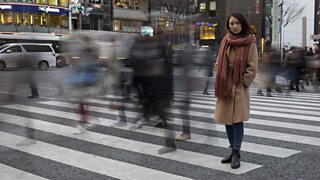Shiori Ito: Japan鈥檚 attitudes to allegations of sexual violence are locked in the past
“What time did you come out of the hotel?”, one of the investigators asked me during what felt like an interrogation.

after I spoke out, the law was amended
I could only remember that it was after 5:30am, but before 6am. I was running from what I had experienced as the worst nightmare in my life – I wasn’t taking a note of the exact time.
It felt to me that the investigator showed little compassion: “If you can’t answer the exact time, you will never win the case, so you should drop it.”
Of course I knew they could not simply take my word, and would have to investigate, especially when the man I was accusing was strongly denying my account, but all I was asking was that they commit to at least do that - investigate.
When I first went to my local police station I asked to speak to a female police officer. The desk sergeant said no female officers were available, and anyway why did I have to speak to a woman. At the time I was very distressed, and I thought it would be obvious to him, but no, despite my repeated requests, unless I could give a concrete reason, no female officer would be found. Standing at the desk, with other people all around growing increasingly impatient with this young woman who was insisting on seeing a female officer, I had to say “I wish to make a complaint of rape”. Finally the desk sergeant relented, I was shown into an interview room and a female officer was found.
When she arrived, I immediately started to pour out my heart to her (a story that the man I was accusing, has since vehemently denied) breaking down many times; the whole tale from when I first met him came out in a flood of tears. When I finally finished, she said she was very sorry, but she was a traffic officer, so could not take my statement. I would have to tell the whole thing again from the top to a sex crime officer – only male officers were available. I later found out that only 8% of police officers in Japan are female.
A male officer came in, and I once again had to give my account of what had happened. After an hour or so I finished, emotionally exhausted. He said that because the hotel where I had been taken was in a different district, he could not file my complaint. I would have to give my statement again, to an officer from the appropriate department in and the relevant police district. Not for the first time, or the last, I considered giving up.
To be fair to the police, they arranged for an officer from the right district to come across town to my local station. But once I had given my statement, he told me that few rape complaints ever lead to convictions, and advised me in the strongest possible terms to drop it. He pointed out that the man I was accusing – who has consistently denied any wrongdoing – was powerful and influential, and that my career as a journalist would probably come to an end if I insisted on making these allegations.
I insisted, but one and a half years later the prosecutors decided there was not enough evidence to bring charges.
On May 29th 2017, I decided to go public, and reveal my name and face to the Japanese press. I did this because I felt we needed to talk about the problems in our society around sexual assault. I felt we needed to change our legal system and social attitude, and I wanted to pressure parliament to pass an amendment to Japan’s 110 years old rape laws.
3 weeks after I spoke out, the law was amended, and some changes have been made - for the first time in over a century: the minimum jail sentence was 3 years, shorter than that for burglary, but now it has been raised to 5 years. However there is still much to be done - Japan’s age of consent still remains 13. Consent is not mentioned in Japan’s rape laws. I hope that the government has will review the law amend it further.
Rape is such a taboo topic in Japanese society but also in the Japanese media.
The media is one of the most male dominated industries in Japan. There are no women on any of the News boards of the Tokyo based TV networks. This is also reflected in the fact that Japan is ranked 114th in the World Economic Forum’s global gender equality rankings for 2017.
Rape victims are often hidden and the word “rape” is replaced with euphemisms like “tricked”(when the victim is minor) or “violated” when a case makes it into the news. Rape is invisible in Japanese society. This is probably the reason why just 1 person was on duty in Tokyo’s only 24 hours rape crisis center (serving a population of 13 million) when I called for help in 2015.
As part of the investigation in my allegations, I was asked to come to the police station adjacent to the hotel I was taken to that night. When I arrived, accompanied by my best friend, for moral support, I was taken to a gymnasium on an upper floor of the station. I had heard about what was about to happen, and asked for my friend to be able to come with me. The police refused. I was taken into the gym and told to lie on a mattress, and lifesize mannequin was then produced and three male officers moved the doll on top of me, asking me intimate questions about exactly what happened and taking photographs. I was told this was essential to the investigation.

the landscape is improving slowly but surely in Japan
It was at this time, that I had make the shift in my head from complainant to journalist - I started to analyse how the police were handling the case and decided to record all my meetings with them. Since then I have set a digital recorder going in my bra just before entering any police station. I was always scared what they would do or say if they found out that I was recording, as I had no lawyer at that time, but I felt I had to have a record of their approach. The only way I have been able to continue has been to completely compartmentalise my feelings - I had to treat this as a story I was following: I was seeking the truth as a journalist, detached and dispassionate. That is still the way I try to frame it in my mind.
The recordings that I had collected over two years finally became a book, that published last year - my journalistic training, and the fact that I had recordings of so many conversations meant that the publisher’s lawyers could be satisfied that my account of my treatment after I made the rape allegation was fair and accurate. I wanted to share my experience to improve both the social and legal support for those who report rape in the future. I wish I did not have to do this, a wish shared by my little sister and my entire family. I have had to move to the U.K. away from my home and family to escape the condemnation and attention that came the moment I went public.
It has been a year since I made that statement in front of that bank of flash bulbs, and the landscape is improving slowly but surely in Japan. The Women in Japanese Media Network was created to protect female journalists and women in media from sexual harassment. The member of the network however choose overwhelmingly to remain anonymous, as they fear online aggression and backlash.
In April 2018, and after the filming of this documentary, the vice finance minister, Junichi Fukuda stepped down after allegations of sexual harassment were made by a female TV reporter. She had also recorded her conversations with him – though he denies any wrongdoing. The female reporter stayed anonymous but told me that what she did was inspired by my actions and the world’s #metoo movement.
It was a landmark move. Women in Japan only dared whisper “Metoo” before, but all women have learned how to support each other. Nevertheless the stigma and backlash is too strong for most, so many are choosing to say “We too” so no one can target “Me.”
In making myself and my story the subject of my own journalism, I crossed many boundaries. No matter how hard I tried to investigate dispassionately, and look at my case from a distance, it’s was still me and it’s still hurting me now, but I felt I had no other choice. The biggest lesson of shifting roles, from the one who asks the questions to the one answers them, is to acknowledge how violating it feels to be asked over and over again “So tell me what happened that night?” even today in U.K.
If the press in Japan was free from the shackles of social convention, then the problems with Japan’s century old rape laws, the lack of rape crisis centres, the re-enacting of alleged rapes with lifesize dolls might have been raised many year ago. Had Japan had a truly free press, I would never have had to go public, leave the country I grew up in, and be subject to a sustained hate campaign online.
But in so doing, I was embracing the right to freedom of speech that I am proud does still thrive in Japan. I spoke out about my experience primarily to highlight what happened afterwards. I felt I had to take this step because I witnessed for myself how hard it is to raise allegations of sexual violence within a media industry which is dominated by men, and in a culture where women are routinely fetishized and reduced to sex objects.
I must say again that no charges were ever brought against Mr Yamaguchi and he is defending my civil claim, but speaking out was my only option. We all have a voice, and in the face on condemnation from some, it is belief and support from others that makes it echo.
